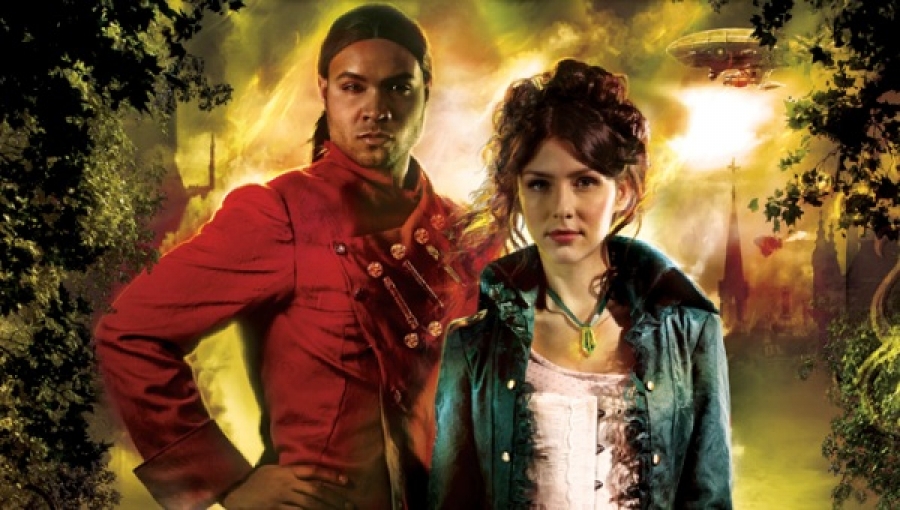The following is an interview with author Beth Cato on the upcoming release of her first novel, The Clockwork Dagger. In this interview, Fanboy Comics Contributor Jodi Scaife chats with Cato regarding her initial attraction to writing, her inspiration for The Clockwork Dagger, and how she managed to combine Steampunk, mystery, and fantasy into one amazing story!
This interview was conducted on August 5, 2014.
Jodi Scaife, Fanboy Comics Contributor: First and foremost, congratulations on the upcoming release of your first novel, The Clockwork Dagger! How and when did you get started as a writer?
Beth Cato: I was one of those weird, little kids who, at age four, started stapling together my own illustrated books. I gave up on writing when I was a teenager, but in my late twenties I realized I wasn’t being true to myself. I needed to write.
JS: What inspired you to write this book, and are there any authors that influenced your writing style?
BC: I wanted to use healing magic in a Steampunk setting, and I hit on the idea of doing a novel like Murder on the Orient Express, but on an airship. I was strongly influenced by C. E. Murphy’s Walker Papers series, Lindsay Buroker’s Encrypted, and Gail Carriger’s Parasol Protectorate series.
JS: There are various genres at play within the book, including fantasy, Steampunk, and mystery. Did you find the myriad of genres to be more challenging or rewarding as a writer when creating the story?
BC: When I wrote the initial book, it felt very natural. I love historical fiction with magic mixed in. My mom raised me on Miss Marple and Hercule Poirot mysteries. The elements play well together for me. I wrote what I’d like to read. Where it gets complicated, though, is the matter of marketing. Steampunk is often classified as science fiction, and readers have certain expectations. My book also heavily draws on epic fantasy and magic. My publisher is trying to emphasize all of that as far as the marketing.
JS: How would you describe the characters of The Clockwork Dagger and their development throughout the writing process (e.g., Octavia being a healer, Alonzo being a man of colour, etc.)?
BC: Octavia doctored in army hospitals throughout her teen years. She’s abnormally strong in her magic and never fit in because of that, and at heart, she really wants a place to belong. She was a hardcore goody-two-shoes in my early drafts, and I softened her considerably through revisions. Alonzo’s character stayed much the same from my original vision. He’s an idealist in a country overwhelmed with corruption. You always hear bad things about traditional publishing and how they regard dark-skinned main characters–that they will be changed or white-washed. I was prepared to fight for Alonzo, but I didn’t have to. My publisher was 100% supportive, and I was overjoyed when they didn’t hesitate to show him on the cover.
JS: When preparing to write a new story, are there any methods of research or preparation that you implement prior to your writing process?
BC: It totally depends on the story. Sometimes, research is necessary before I even start, but other times it can wait until I’m further along in the process and realize that I have knowledge gaps I need to fill. I use Wikipedia as a starting point, and I scroll down to the footnotes to find the full sources. I buy a lot of used books!
JS: Traditional publishing is a Holy Grail for many writers. If possible, would you mind describing your experience of acquiring a publisher, and had you considered self-publishing?
BC: I have a number of friends who’ve been very successful with self-publishing. It’s definitely an option. I wanted to go the traditional route, though, because I always had that wistful desire to walk into a bookstore and find my book on the shelf. That’s possible as an indie, but a lot harder.
I had a long journey up to this point. I wrote a number of novels that I trunked. I wrote an urban fantasy novel, worked on it for several years, and that’s what brought me and my agent together; however, she was unable to sell the book. I won’t lie–this was devastating for me. I loved that book (still do), and it crushed me that it went nowhere. This was the point where I started work on The Clockwork Dagger. I spent a prolonged time revising it, and when my agent began submitting it to publishers, I tried to pretend it wasn’t happening. I was terrified of being crushed again. I was gobsmacked when we ended up having three offers from editors!
JS: Are there any additional projects on which you are working that you are able to share with our readers?
BC: I recently had my editor’s letter arrive for my sequel novel, The Clockwork Crown, so I’ve been camping in revision-land for the past while. That book will come out in about a year. I have another Steampunk series in the works, too.
JS: Is there anything else you’d like readers to know about you when reading The Clockwork Dagger or your other works?
BC: Well, I started reading and writing in the fantasy genre because of my love for old-school role-playing games like Final Fantasy IV and Dragon Quest IV. They had a huge impact on my life–I met my husband because we both loved Final Fantasy! Readers of The Clockwork Dagger can look for little tributes to these games throughout the books.
JS: Lastly, what is the best way for our readers to find more information regarding The Clockwork Dagger?
BC: I maintain a website at BethCato.com. Visitors can read the first chapter of the book through my site, find out about my characters, or even follow along with my Wednesday recipe posts. They can find links to all my other published works, too.
*The Clockwork Dagger will be released on September 16, 2014.

